
Imprimatur by Joannes J. Glennon, 1916
First Years of the Church (A.D. 30-42)
On Pentecost, the harvest feast of the Jєωs, the Holy Ghost descended on the assembled Apostles and disciples. After Peter's first sermon, three thousand were added to the Church; and a little later over five thousand more. These early Christians "were persevering in the teaching of the Apostles and in the communion of the breaking of bread and in prayer." They had a common fund. Seven deacons were appointed to take care of the poor and to assist in the preaching of the word of God. Mathias was chosen as an Apostle soon after the defection of Judas.
Peter and John were accused before the Sanhedrin for having cured a lame man, and were forbidden to teach in the name of Christ. Before long, all the Apostles were imprisoned and scourged. The bitter opposition of the Jєωs broke out in an open persecution of the Christians; and the first victim, St. Stephen, was stoned to death in the year 36. Persecuted Christianity now gained disciples everywhere. Enlightened by God in the three visions of unclean animals, Peter received the first pagan convert, Cornelius the centurion, into the Church.
Herod Agrippa began to persecute the Christians about the year 44. St. James the elder, brother of St. John, was put to death; St. Peter was imprisoned, but having been liberated by an angel, "he went into another place," probably Rome.
St. Paul (37-67).-- Saul, a young Pharisee of Tarsus in Cilicia, a disciple of Gamaliel, had approved St. Stephen's death; but, as he was on his way to Damascus, Our Lord appeared to him and the violent enemy of the Christians was converted and baptized in the year 37. He remained in solitude for three years, and then went to Jerusalem " to see Peter." At Antioch he was ordained and officially recognized as an Apostle of the Gospel. Soon afterward, in company with Barnabas, he set out on his first missionary journey (46 - 48). He went first to Cyprus where he converted the proconsul, Sergius Paulus; passed thence to Asia Minor, spreading the Gospel and strengthening the people in the faith of Christ; and then returned to Antioch, and was known by the name of Paul.
Meanwhile a great controversy had arisen in the church of Antioch. The Jєωιѕн Christians contended that the Gentiles, who were admitted into the Church without circuмcision, should be made subject to the Law of Moses. The difficulty was settled by the Apostolic Council of Jerusalem (in the year 50) in the following decision:
"It hath seemed good to the Holy Ghost and to us to lay no further burden upon you than these necessary things, that you abstain from things sacrificed to idols and from blood and from things strangled and from fornication." Out of consideration for the Jєωιѕн Christians, Peter had up to this time observed the Mosaic Law. Paul reproved him, fearing that the pagan converts might be led astray if the head of the Church continued to observe the Law of Circuмcision. As to the Law itself, both Apostles were of one mind in regarding it as superseded by the New Teaching of Christ.
In the years 50 - 53, St. Paul made his second missionary journey. It extended to Asia Minor, Macedonia, Greece, --where he tarried a year and a half at Corinth, --Ephesus and Antioch.
On his third missionary journey (53-57), St. Paul went to Asia Minor, remained over two years at Ephesus, and then visited Corinth, Macedonia, Miletus, Caesarea and Jerusalem. Immediately upon his arrival in Jerusalem, the Jєωs attempted to put him to death, but the guard of the temple freed him. Having spent two years in prison at Caesarea (57 - 59), St. Paul appealed to Caesar, and was sent to Rome, where he was imprisoned for two more years (60 - 62). Having recovered his freedom, he went to the far West (Spain), then to Asia Minor, Macedonia and Crete. He was again imprisoned and at last beheaded in Rome, on June 29th, of the year 67.
Missionary Labors of St. Peter.-- The early labors of St. Peter in Palestine are recorded by his companion, St. Luke, in the first twelve chapters of the Acts of the Apostles. St. Luke afterwards became the companion of St. Paul, and for this reason the subsequent labors of St. Peter are not so well known as those of St. Paul. Soon after receiving the centurion and his household into the Church, Peter, the prince of the Apostles, presided as bishop over a large congregation at Antioch, where the followers of Christ were first called "Christians." Later on, we see him as missionary traversing Pontus, Galatia, Cappadocia and other countries. In the beginning of the reign of Claudius, about the year 42, he arrived at Rome where he established a church and presided over it as bishop.
In Rome, St. Mark, a companion of St. Peter, wrote the second of the four Gospels and St. Peter approved it . St. Peter then sent Mark to Alexandria to establish a Christian church and govern it as bishop. The churches of Rome, Jerusalem, Antioch and Alexandria justly trace their origin to St. Peter, and are honored as patriarchal sees. St. Peter was martyred at Rome, together with St. Paul, June 29, 67. He was crucified, as Our Lord had foretold.
St. Peter in Rome.-- St. Peter had labored in Rome during a visit previous to the last sojourn, which ended with his death. This fact is proved:
1. By many docuмents of Christian antiquity:
(a.) The writings of Clement of Rome, Ignatius, Papias, Irenaeus, Cyprian, Epiphanius, Eusebius, Orosius and Jerome.
(b.) The Liberian catalogue of popes, compiled about the year 360.
(c.) The ancient martyrologies which note a feast established in honor of "the chair of St. Peter which he first used at Rome."
(d.) The works of Suetonius, a pagan writer who tells of the expulsion of the Jєωs from Rome by Claudius, because "at the instigation of a certain Chrestus" (Christ) they created continual disturbances, thus proving that there existed in Rome a Christian community as early as the reign of Claudius (41-54), the time when Peter first visited Rome.
2. By the Sacred Scriptures:
(a.) The first Epistle of Peter was written from a city which was called Babylon. Now this cannot mean the ancient Babylon on the Euphrates, which, according to Pliny and Strabo, had at this time become "a great solitude." St. Peter did not extend his missionary labors so far as that Babylon, nor was there ever a Christian community there. Moreover, "Babylon" is a very natural figurative expression for Rome. In this sense it was understood by Papias, a disciple of the Apostles, as Eusebius notes.
(b.) That there was a Christian community in Rome before the advent of St. Paul, is proved by St. Paul himself, for he longed "to see the Roman church, whose faith is spoken of throughout the world." Moreover the church of Rome was already in a flourishing condition about the year 57, when St. Paul wrote his Epistle although he himself had not, as yet, visited it. Who founded the Roman church, if it was not Peter? No other Apostle has ever been mentioned as its founder.
3. By ancient church history. The date of St. Peter's sojourn in Rome, as established by tradition (i. e. during the time from his baptism of Cornelius to his imprisonment by Herod Agrippa, 38-44) fits in well with the fact that, during all this time, we have no historical record of Peter's presence anywhere else.
St. Peter, of course, did not remain constantly in Rome. In the year 50 he presided at the Apostolic Council of Jerusalem, and he went also to Corinth, Antioch and other places.
The Other Apostles.-- Concerning the other Apostles we know very little. St. James the elder suffered death about the year 42. St. James the younger, first bishop of Jerusalem, was stoned to death in 62. St. John, the brother of James the elder, was imprisoned with St. Peter in Jerusalem. Afterwards, while residing in Ephesus, he governed the growing congregations of Asia Minor, and gathered around him some distinguished disciples, e. g., Ignatius and Polycarp. During the reign of Domitian, he went to Rome, where he was thrown into a cauldron of boiling oil. Having been miraculously preserved, he was banished to the island of Patmos, in the Mean Sea, where he wrote the Apocalypse, or Book of Revelations. After the death of Domitian, in the year 96, he returned to Ephesus, and there wrote the fourth Gospel to prove the divinity of Christ. His constant sermon was, "Little children, love one another." He died about the year 101.
For the rest we have to rely upon traditions. All the Apostles, except St. John, suffered martyrdom. St. Andrew preached the Gospel in Scythia (Southern Russia), St. Thomas in Parthia, St. Bartholomew in Southern Arabia (India), St. Philip in Phrygia. With regard to the death of the Blessed Virgin, there are two traditions, the first of which states that she died in Jerusalem, about the year 45, surrounded by the Apostles; the other, that she accompanied St. John to Ephesus, where she died at a later date.
Before the close of the first century, we find Christian communities in Palestine, Syria, Mesopotamia, Asia Minor, Macedonia, Greece, Italy, Spain, Ethiopia and Egypt. These communities included many persons of education and good social position. That the new converts did not belong solely to the poor and illiterate class is proved:
1. By the many martyrs in the highest stations of life, e. g., Flavius Clemens, a cousin of Domitian.
2. By the rich contributions to the Church.
3. By the frequent refutations of the false systems of pagan philosophy.
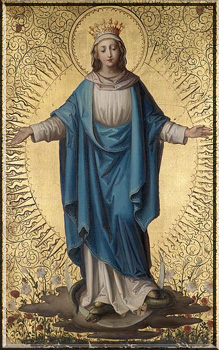


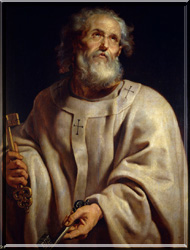
Saint Peter, a Galilean fisherman, the chief Shepherd of Christ's flock, was chosen by Him to be the Prince of the Apostles, and the Rock upon which He was to build His indestructible Church. | 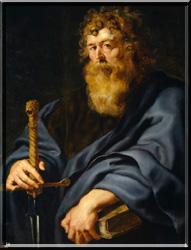
Saint Paul was raised as a strict Pharisee. Engaged as a young man in persecuting the Christians, he was miraculously converted to their fiath. He became before his death the Apostle of the Nations. |
Feast Day Ss. Peter and Paul: June 29th
Ss. Peter and Paul, Apostles
Sermons for St. Peter
and St. Paul by Fr. Weninger
Feast Day: January 18th
Chair of St. Peter Apostle at Rome
Feast Day: January 25th
Conversion of St. Paul
Conversion of St. Paul Gospel: Q and A
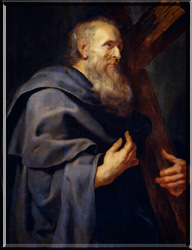
Saint Philip, a Galilean, is remembered for telling Nathanael that he had found the Messias, and for taking him to Christ. His preaching took him to Phrygia, where he suffered martyrdom. | 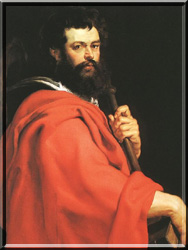
Saint James the Less was the brother of Saint Jude and a counsin of Jesus. While serving as Jerusalem's first bishop, he was arrested by the Jєωs and killed by being hurled down from the Temple roof. |
Ss. Philip and James, Apostles
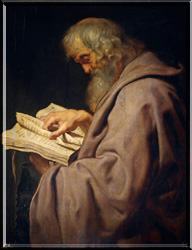
Saint Simon, the brother of James and Jude, is surnamed the Zealot. He and Saint Jude are said to have preached in Egypt and Persia and to have suffered martyrdom for the faith in Mesopotamia. | 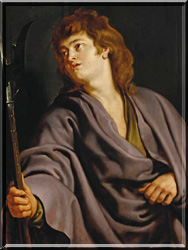
Saint Jude, a brother of Saint James the less and a cousin of Jesus, wrote a Catholic Epistle of the New Testament. It is customary with many to pray to him in seemingly "hopeless" situations. |
Sts. Simon and Jude, Apostles
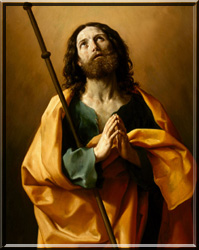
Saint James the Greater, son of Zebedee and brother of Saint John, was one of the Apostles particularly close to the heart of Christ. He was one of the three who witnessed the Transfiguration of Jesus on Mount Thabor, and His agony in Gethsemane. Christ foretold his martyrdom, which took place under Herod Agrippa (41 - 44 A.D.). | 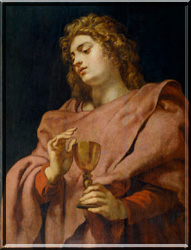
Saint John, the desciple whom Jesus loved, author of the fourth Gospel, and the only Apostle at the foot of the Cross, was chosen by Our Lord to care for His Mother. He preached in Samaria and was eventually banished to the island of Patmos, where he wrote the Apocalypse. Tradition has it that Saint John died in Ephesus about 100 A.D., the only Apostle not martyred. |
St. James the Greater, Apostle
Feast Day St. John: December 27th
St. John, Apostle and Evangelist
Octave of St. John the
Apostle and Evangelist
St. John before the Latin Gate
St. John the Apostle Gospel: Q and A
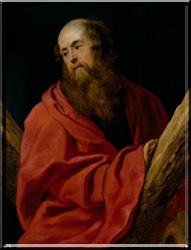
Saint Andrew, brother of Saint Peter and at first a disciple of Saint John the Baptist, was among the early followers of Christ. According to tradition, Andrew preached extensively throughout Greece and Asia Minor. He was martyred on an X-shaped cross in Achaia, in southern Greece. | 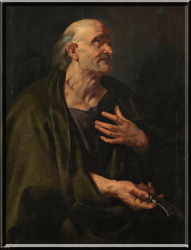
Saint Bartholomew, whose name appears only in the lists of the Apostles, is believed to be Nathanael, whom Philip brought to Christ. He preached in Persia and Egypt and was flayed alive in Armenia. His relics are thought to be in the Church of Saint Bartholomew in Rome. |
St. Andrew, Apostle
Feast Day St. Bartholomew: August 24th
St. Bartholomew, Apostle
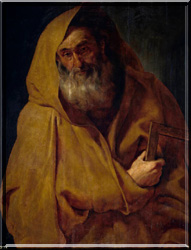
Saint Thomas, called the Twin, is simply listed among the Apostles in the first three Gospels. In the Gospel of Saint John, however, Thomas is remembered for doubting the Resurrection of Christ until he had touched the wounds in His hands and side. Thomas evangelized parts of India and died in Mylapore. | 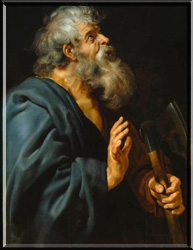
Saint Matthew, also called Levi, was a wealthy tax collector in Capharnaum when Jesus called him to be an Apostle. His has the honor of having written the first of the Gospels, in which the whole of the Sermon on the Mount is recorded. |
St. Thomas, Apostle
Feast Day St. Matthew: September 21st
St. Matthew, Apostle and Evangelist
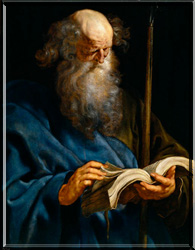
Saint Matthias, who had followed Jesus from John's baptism to the Ascension, was chosen to take the place of Judas among the Apostles. Little is known with certainty of his life and martyrdom. |
Feast Day St. Matthias: February 24th
St. Matthias, Apostle
The Apostles Creed
I BELIEVE in God, the Father Almighty, Creator of heaven and earth; and in Jesus Christ, His only Son, our Lord; Who was conceived of the Holy Ghost, born of the Virgin Mary, suffered under Pontius Pilate, was crucified, died, and was buried. He descended into hell; the third day He arose again from the dead; He ascended into heaven and sitteth at the right hand of God, the Father Almighty: from thence He shall come to judge the living and the dead. I believe in the Holy Ghost, the Holy Catholic Church, the communion of Saints, the forgiveness of sins, the resurrection of the body, and life everlasting. Amen.
[color]
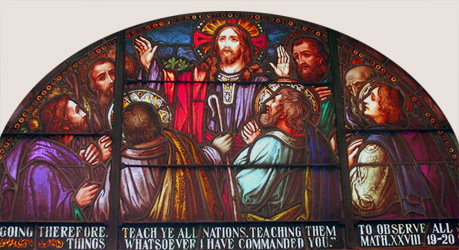
The Creeds Or Symbols Of Faith
[/color]The chief things which God has revealed, and the truths of salvation, are contained in an abridged form in the formula of faith composed by the Apostles.
This formula is called a Creed or Symbol. It is called Creed from the Latin word Credo, I believe, and inasmuch as it contains the principal Articles of our faith or belief. It is called the Symbol from the Greek word, a sign or mark. The recital of the Symbol of the Apostles, like the sign of the Cross, is the mark of a Christian, and the pass-word of a soldier of Christ. The word Symbol also signifies a collection, an assemblage or reunion, and, in this sense, it is rightly used to signify the abridged formula of our faith, that is, a collection of the principal truths which every Christian should know and believe.
"A Creed may therefore be defined as a summary or rule of faith made up of various Articles of faith, and proposed to the faithful as a sign of their profession."
According to Benedict XIV., the Symbol of faith is a certain sign by which the faithful are discernable from infidels; the simile being taken from the military sign by which soldiers of different countries are distinguished.
[color]
The Apostles' Creed.
[/color]The first Creed or Symbol of faith is that of the Apostles. It is called the Apostles' Creed because it was composed by the Apostles before their dispersion, and attributed to them by the whole Church (some say ten years after our Saviour's Passion, but they were dispersed long before that time). That we have the Creed from the Apostles may be proved, first, from the Sacred Scripture. We find in the Epistles of St. Paul passages which clearly refer to the Creed. He writes in his Epistle to the Romans: "But thanks be to God, that you were the servants of sin, but have obeyed from the heart unto that Form Of Doctrine Unto which you have been delivered (Rom. vi. 17)." And in his Epistle to Timothy he tells him to "Hold the Form Of Words which thou hast heard from me in faith, and in the love which is in Christ Jesus (2 Tim. i. 13)."
St. Paul, in his first Epistle to the Corinthians, gives a short outline of the Creed in the words: "For I delivered unto you first of all which I also received, how that Christ died for our sins according to the Scriptures; and that He was buried, and that He rose again the third day according to the Scriptures (1 Cor. xv. 3, 4)."
Also I may notice from the Acts of Apostles, that St. Philip required a profession of faith from the Ethiopian before he admitted him to Baptism: "And Philip said, if thou believest with all thy heart, thou mayst (be baptised). And he answering said, I believe that Jesus Christ is the Son of God (Acts. viii. 37, et seq).''
There was, therefore, & formula of faith in use in the time of the Apostles, and used by them, which we hold; and this must have been the same as the Apostles' Creed, which, tradition tells us, the Apostles composed and agreed upon as the formula of faith before their dispersion.
It has been in use from the very time of the Apostles even to our own day. St. Clement, Pope and Martyr, and disciple of the Apostles, tells us that the Apostles composed the Creed which the faithful had to profess in his day. St. Irenaeus, an Apostolic man, who lived near the time of the Apostles, and was taught by the immediate disciples of the Apostles, cites the Creed and the arrangement of its Articles as the work of the Apostles; and Tertullian speaks of it as the rule of faith common to all Christians, and says, that this divine work has preceeded all heresies.
St. Cyprian, St. Ambrose, St. Jerome, and St. Augustine, and all the Fathers and Doctors of the Church after them, regard it as a fact, established by the clearest and most invincible tradition, that the Apostles assembled, and, full of the Holy Spirit, composed this summary or formula of Christian doctrine, which has been taught in the Church ever since.
It is not, however, certain that each of the Apostles composed a separate and single Article, as for example, St. Peter, the first; St. Andrew or St. John, the second; St. James, the third ; and so on. This, as I have said, is not known with any certainty, and it is not a matter of much importance. What is of importance is, that which we know for certain; viz.: that the Creed is the work of the Apostles, and that we can consider it the work of God Himself, as the Apostles were inspired by God, and the truths were interiorly dictated by the Holy Spirit, the Teacher of all truth; those same truths which they had heard from Jesus Christ Himself, and learned from His teaching.
This Creed was composed by the Apostles for the following reasons: (a) That they might have one and the same rule of faith to propose to the people; (b) that the faithful, individually, might have a short form of faith which they could learn by heart, and remember; (c) that the faithful might be preserved from false teachers, who would try to pervert the faith.
[color]
The Division Of The Creed.
[/color]Cardinal Bellarmine divides the Apostles' Creed into two parts. In the first, he places the eight Articles which regard God; and in the second, the four which regard the Church.
Most other authors, in imitation of the Catechism of the Council of Trent, divide the Creed into three parts, referring each part to one of the Three Persons of the most Holy Trinity. According to this division, the first part treats of the Eternal Father, His Divinity, His Omnipotence, the creation of the world and of mankind, and all things visible and invisible. The second part treats of God the Son, and the marvellous work of Redemption, the Incarnation of this divine Person, His Birth, His Passion, His Death, His Resurrection, and Ascension into heaven, and His coming at the end of time to judge the world.
The third part treats of the Holy Ghost, and the works which He performs through His Spouse, the Church, which are principally these: the Communion of Saints, the Forgiveness of sins, and the Resurrection of the body; all these in order to the possession of Life Everlasting.
[color]
The Apostles' Creed is also divided into twelve Articles, as follows:
[/color] I. I believe in God the Father Almighty, Creator of heaven and earth.
II. And in Jesus Christ, His only Son, our Lord;
III. Who was conceived by the Holy Ghost, born of the Virgin Mary,
IV. Suffered under Pontius Pilate, was crucified, died, and was buried.
V. He descended into hell; the third day He rose again from the dead;
VI. He ascended into heaven, and sitteth on the right hand of God the Father almighty;
VII. From thence He shall come to judge the living and the dead.
VIII. I believe in the Holy Ghost,
IX. The Holy Catholic Church, the Communion of Saints,
X. The forgiveness of sins,
XI. The resurrection of the body, and
XII. Life Everlasting. Amen.
[color]
The following Articles of the Creed are commemorated
by the Church on special Festivals, viz.:
[/color] Christmas Day. Art. III. Who was conceived by the Holy Ghost, born of the Virgin Mary,
Good Friday. Art IV. Suffered under Pontius Pilate, was crucified, died and was buried;
Easter. Art. V. He descended into hell; the third day He rose again from the dead;
Ascension Day. Art. VI. He ascended into heaven, and sitteth at the right hand of God the Father almighty;
Advent. Art. VII. From thence He shall come to judge the living and the dead.
Whit Sunday. Art. VIII. I believe in the Holy Ghost,
All Saints Day. Art. IX. The Holy Catholic Church, the Communion of Saints."
[color]
The Obligations Or Duties Of Catholics With Regard To The Creed.
[/color]Our duties in regard to the Creed are (besides the obligation of believing firmly the truths it contains, and professing them), to know it, and to recite it often.
(a) We should learn the Creed and know it. The Apostles composed it in order that the faithful might learn and know it. The Church has on this account ordered, all along, that her children should be instructed in the Creed, that her Pastors should explain it, and that parents should teach it to their children.
All are therefore obliged to learn and know the Creed. St. Leo says that no one is allowed to be ignorant of it. St. Maximus, in his day, reckoned amongst the greatest enemies of the faith, those amongst the baptized who were ignorant; and, in our day, we may reckon amongst the greatest enemies of the faith, Catholics who, without any excuse, are ignorant of the doctrine of their religion.
St. Thomas regards, as a mortal sin, wilful ignorance of the Creed. St. Charles Borromaeo considered a person ignorant of the Articles of the Creed, at least as to their substance, unworthy of absolution.
(b) We should recite the Creed often, in order to keep it impressed upon our memory, to nourish and strengthen our faith, to profess our faith, and preserve it against dangers and temptations. It forms part of our morning and evening prayers.
It is said by priests and religious in the Divine Office before Matins and Prime in the morning, and after Complin in the evening.
St. Ambrose exhorts his sister to recite the Creed often. He advises her to say it every morning and every evening; and to look into it, as into a mirror, often during the day, that she may therein see her faith, and know whether she be truly faithful.
St. Augustine, in addressing his Catechumens, says to them, "Receive, my dear children, this rule of faith which we call the Symbol or Creed; engrave it on your hearts; carry it about always with you that it may be your defence, and that your memory may be an open book wherein you can read it continually."
The custom of saying the Creed frequently is the means of preserving the faith amongst the people. I believe it was one of the great means which the people of Ireland used, for the preservation of their faith in the days of persecution. The Creed is said amongst her people more often than amongst any other people. They generally say it either before or after the Rosary, and in some places both before and after; and the Creed forms a part of all their public devotions, and the private and family devotions which are said by the people in their own homes. [color]
http://catholicharboroffaithandmorals.com/
[/color]
|